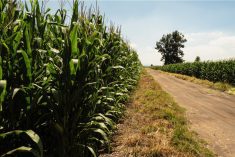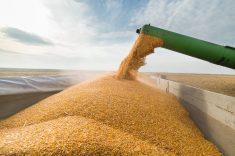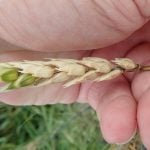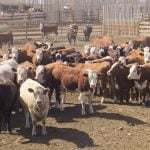Exports of fresh potatoes from Prince Edward Island to the mainland U.S. are expected to resume “soon” as U.S. officials move to put new rules in place for such shipments.
The U.S. Department of Agriculture’s Animal and Plant Health Inspection Service (APHIS) said Thursday that Canada “is expected to soon resume exporting (P.E.I.) table stock potatoes into the contiguous United States.”
APHIS said in a release that the move is a “result of the U.S. and Canada reaching an understanding about the risk of table stock potato imports from P.E.I.”
Read Also

Farmers, traders ‘flying blind’ as U.S. shutdown blocks key crop data
U.S. data vital to global grain and soybean trading has gone dark during the country’s federal government shutdown, leaving commodity traders and farmers without crop production estimates, export sales data and market reports during the peak of the autumn harvest.
Canada’s Agriculture Minister Marie-Claude Bibeau acknowledged APHIS’ decision Thursday on Twitter, saying USDA had “confirmed the resumption of trade for P.E.I. table stock potatoes into the U.S. (with) reasonable science-based conditions.”
“This reopening comes at a critical time for the industry,” Bibeau said in a later statement. “Potato exports are essential for the livelihoods of so many Islanders, and I am confident that this decision by the U.S. will give farmers the predictability and assurances they need for the next potato growing season.”
Following the confirmation of the fungus that causes potato wart in two P.E.I. fields last October, APHIS on Nov. 22 advised U.S. border officials to reject shipments of P.E.I. potatoes, leaving the Canadian Food Inspection Agency “unable to certify potato shipments… given that the exports no longer met the importing country’s requirements.”
P.E.I. has seen 35 detections of potato wart since October 2000. The fungal disease, which appears mainly on stolons and tubers, can reduce yields and make potatoes unmarketable. The U.S. and all mainland Canadian provinces are today considered to be free of potato wart.
The discovery of the disease in the province in 2000 had led the U.S. to briefly close its borders to P.E.I. potatoes until the province’s Potato Wart Domestic Long Term Management Plan was put in place months later, allowing exports from lower-risk zones where the fungus hasn’t been detected and where the same equipment wasn’t used.
Now, Bibeau said in Thursday’s statement, APHIS “has completed their pest risk analysis and concluded, like Canada, that the trade of P.E.I. table stock potatoes can be done safely.”
APHIS said Thursday that Canada will lift the November ban while the agency “plans to publish a federal order outlining additional required mitigations to protect the U.S. potato industry.”
Publication of a U.S. federal order “outlining the required mitigations” for table stock potatoes is expected to take about 10 business days, an APHIS spokesperson said via email Thursday.
USDA and CFIA rules will require that imported table stock potatoes from P.E.I. — and the seed potatoes used to produce those table stock potatoes — must originate from fields not known to be infested with potato wart or associated with known infestations, APHIS said Thursday.
The table stock potatoes, APHIS said, “must be washed in P.E.I. to remove soil, treated with a sprout inhibitor, and graded to meet the U.S. No 1 standard. Shipments must be officially inspected by (CFIA) and certified as meeting USDA requirements.”
Meanwhile, seed potatoes from P.E.I. for planting in the U.S. “are not allowed importation at this time,” the APHIS spokesperson said separately.
APHIS said it “will continue to work with Canada to increase confidence in its long-term management plan for potato wart, specifically to finish processing remaining samples associated with recent detections, to expand surveillance of non-regulated fields in P.E.I., and to continue its national surveillance program.”
“USDA bases all our agricultural trade decisions on sound science,” U.S. Agriculture Secretary Tom Vilsack said in Thursday’s release. “We are confident that table stock potatoes can enter the United States with appropriate safeguards in place to ensure the U.S. potato industry remains protected.”
CFIA, Bibeau said Thursday, “will work in collaboration with industry to implement the new export requirements for the U.S. in short order” and will complete its ongoing investigations in P.E.I. and technical work to provide APHIS with the “necessary, science-based assurances in order to fully restore the trade.”
APHIS’ announcement comes as Canada’s federal opposition Conservatives said earlier this week that the Canadian government was “no closer to a solution” on the matter “and P.E.I. farmers are paying the price.”
“As a result of our inability to export produce to the United States, more than 300 million pounds of potatoes have been destroyed or left to rot, and multi-year damage has been done to the potato seed industry,” Conservative ag critic John Barlow said Monday in a statement.
“It is heartbreaking for P.E.I. farmers to destroy what was a bumper crop, but now Liberal inaction has put next year’s season in jeopardy. The irreparable damage to the agriculture industry in P.E.I. will be felt for generations to come.”
Exports of fresh potatoes were allowed to resume last month from P.E.I. to the U.S. territory of Puerto Rico, which is considered to be at low risk for the disease as it has no commercial potato industry of its own.
The Canadian government in December pledged up to $28 million to help P.E.I. potato producers manage the surplus of potatoes resulting from the U.S. export suspension.
A resulting program, which also included $12.2 million in provincial funding, was formally launched in February with the goal of “diverting as many potatoes as possible to processors, packers and food banks.”
Where needed, the program was also expected to help P.E.I. potato growers cover the cost of “environmentally-sound destruction of surplus potatoes” at a rate of up to 8.5 cents per pound.
The U.S. in 2020 was by far P.E.I.’s biggest customer for potatoes, taking $476.9 million in fresh or chilled and processed potato goods, or just over 92 per cent of the province’s total potato exports, the province said last fall. Those product categories alone formed almost 84 per cent of the province’s total agricultural and agri-food exports last year. — Glacier FarmMedia Network

















